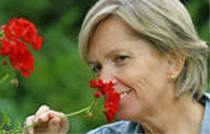|
|
Menopause as new period of woman life
|
|

The time of menopauseMost women think of menopause as the time of life when their menstrual periods end. This usually occurs during middle age, when women are also experiencing other hormonal and physical changes. For this reason, menopause is sometimes called the "change of life". As hormone levels fall, a woman's pattern of menstrual bleeding usually becomes irregular. Many women experience light, skipped or late periods for several months to a year before their periods stop altogether. Some women may experience heavier-than-normal bleeding. It is important to realize that until menopause is complete, a woman still can become pregnant even when periods are light or missed. For most women, menopause is a normal process of aging. If a woman has had her ovaries removed by surgery or has had damage to her ovaries for other reasons, such as radiation therapy, she may become menopausal from that process. A woman can have irregular periods for several months to years before her periods finally stop. Any vaginal bleeding that develops after a year of no periods is abnormal and should be evaluated by a doctor. As estrogen levels fall, the vagina's natural lubricants decrease. The lining of the vagina gradually becomes thinner and less elastic (less able to stretch). These changes can cause sex to be uncomfortable or painful. They can also lead to inflammation in the vagina known as atrophic vaginitis. These changes can make a woman more likely to develop vaginal infections from yeast or bacterial overgrowth and urinary tract infections. As estrogen levels drop and remain low during menopause, the risk of developing osteoporosis increases. The risk is greatest for slender, white or light-skinned women. You can help prevent osteoporosis by getting enough vitamin D through sunlight or a daily multivitamin, eating a diet rich in calcium and performing regular exercise. Women should start taking these actions well before menopause begins. This is because women begin to lose bone mass as early as age 30 but fractures resulting from osteoporosis don't occur until 10 to 15 years after menopause. For most women, the diagnosis of menopause is made based on a woman's description of her symptoms and the ending of her menstrual periods. Laboratory testing is not usually needed. At the time of menopause, doctors often recommend a bone density measurement. The test result sometimes will detect early osteoporosis. More often the result is used as a baseline to compare rate of bone loss in the future. Estrogen taken as a pill or applied to the skin as a patch can reduce hot flashes, sleep disturbances, mood changes and vaginal dryness. Estrogen can be prescribed alone when a woman no longer has her uterus. A combination of estrogen and progesterone is used when a woman still has her uterus. Progesterone is necessary to balance estrogen's effect on the uterus and prevent changes that can lead to uterine cancer. All postmenopausal women who have osteoporosis or are at risk of osteoporosis should take calcium and vitamin D supplements. The usual recommended supplemental dose is 1,000 milligrams of calcium carbonate (taken with meals) or calcium citrate daily. It is best to take this as 500 milligrams twice a day. Women also need 800 international units of vitamin D daily. Etidronate (Didronel), alendronate (Fosamax) and other similar drugs are the most effective medicines that can be used to both prevent and treat osteoporosis. They increase bone density and decrease the risk of fractures. The use of soy products in the diet such as tofu may have benefit for some women. Soy has small amounts of phytoestrogens (plant estrogens) that may help relieve hot flashes. Researchers speculate that the soy-based diet of Japanese women plays a role in preventing hot flashes. However, it's not clear whether Japanese women have fewer hot flashes or whether they report this problem less often. There is no relation between the time of a woman's first period and her age at menopause. The age at menopause is not influenced by a woman's race, height, number of children or use of oral contraceptives.
Definitions and terms on this pageUnderstanding modern dental health and dental clinic advanced abilities
|
|
Information in this document about Woman health named Menopause as new period of woman life is for End User's use only and may not be sold, redistributed or otherwise used for commercial purposes. The information is an educational aid only. It is not intended as medical advice for individual conditions or treatments of Woman health. Additionally, the manufacture and distribution of herbal substances are not regulated now in the United States, and no quality standards currently exist like brand name medicine and generic medicine. Talk about Woman health to your doctor, nurse or pharmacist before following any medical regimen to see if it is safe and effective for you. © Copyright 2007 World Education Society, Woman health office. |
